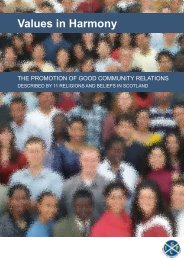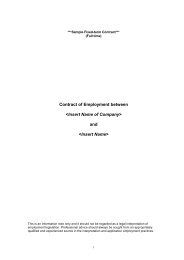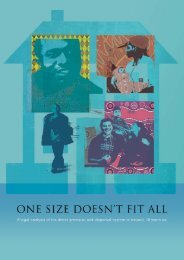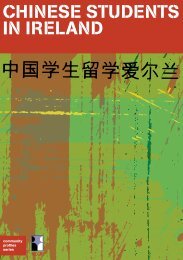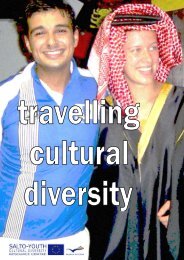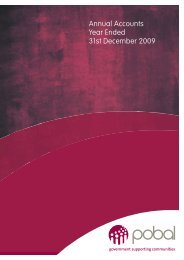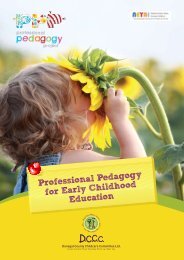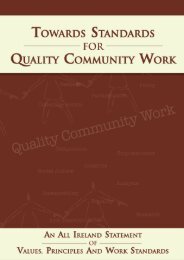Intercultural Education in the Post-Primary School - National Council ...
Intercultural Education in the Post-Primary School - National Council ...
Intercultural Education in the Post-Primary School - National Council ...
Create successful ePaper yourself
Turn your PDF publications into a flip-book with our unique Google optimized e-Paper software.
• support <strong>the</strong> student who was <strong>the</strong> target ofdiscrim<strong>in</strong>atory behaviour, and with dueregard to <strong>the</strong> sensitivities of o<strong>the</strong>rstudents, affirm <strong>the</strong>m with specificreference to <strong>the</strong> focus of <strong>the</strong> o<strong>the</strong>rsstudent’s discrim<strong>in</strong>ation. For example, ifo<strong>the</strong>r students have made fun of <strong>the</strong>irname, identify that <strong>the</strong>ir name is beautifuland that millions of people world-widewould love to have that name;• enable students who engage <strong>in</strong>discrim<strong>in</strong>at<strong>in</strong>g behaviour to relate tohow <strong>the</strong>y would feel if <strong>the</strong>y werediscrim<strong>in</strong>ated aga<strong>in</strong>st <strong>in</strong> a similar way;• help students identify why <strong>the</strong>y wereuncomfortable with difference. Forexample, identify if <strong>the</strong>re is amisconception or a prejudiced beliefwhich underlies <strong>the</strong>ir actions andaddress <strong>the</strong>se causes immediately, and if,appropriate, <strong>in</strong> on-go<strong>in</strong>g work.(These suggestions draw on <strong>the</strong> work ofDerman-Sparks’ (1989) The Anti-BiasCurriculum.)Teachers can, through <strong>the</strong>ir <strong>in</strong>teractionwith students, provide un<strong>in</strong>tentional<strong>in</strong>appropriate cues to students. They may,for example, f<strong>in</strong>d it difficult to pronounceunfamiliar names or identify appropriatelanguage for referr<strong>in</strong>g to ethnic groupssuch as not know<strong>in</strong>g whe<strong>the</strong>r to refer tosomeone as black, white or a Traveller.Teachers may also have unconsciously heldideas about <strong>the</strong> normality of culturalartefacts (‘normal’ homes, ‘normal’ food,‘normal’ hairstyles etc.). In order toprevent <strong>in</strong>appropriate messages be<strong>in</strong>g<strong>in</strong>advertently transmitted to students, it isvaluable for teachers to reflect on <strong>the</strong>irown language and <strong>in</strong>teractions <strong>in</strong> <strong>the</strong>classroom as part of <strong>the</strong> process ofreview<strong>in</strong>g <strong>the</strong> classroom environment.BUILDING A CO-OPERATIVE LEARNINGENVIRONMENTTraditional classroom organisationemphasises <strong>in</strong>dividualistic, competitivevalues. However, alternative approaches toclassroom organisation, based on acooperative model, can produce positiveacademic and social outcomes for nearlyall students.Co-operative learn<strong>in</strong>g opportunities givepupils an opportunity to work closely withpeople from different social, ethnic orability groups. Co-operative learn<strong>in</strong>gshould give rise to frequent, mean<strong>in</strong>gfuland positive contact <strong>in</strong> which <strong>the</strong> diversityof skills and capacities of differentmembers of <strong>the</strong> group are brought to <strong>the</strong>fore and can be recognised. Such<strong>in</strong>terpersonal contact provides a key site oflearn<strong>in</strong>g. Relationships between students ofdifferent groups have been demonstrated toimprove significantly if mixed-group cooperativelearn<strong>in</strong>g strategies are used,irrespective of <strong>the</strong> content that is covered.In addition, ethnic m<strong>in</strong>ority students haveshown greater academic ga<strong>in</strong>s <strong>in</strong>cooperative sett<strong>in</strong>gs than <strong>in</strong> traditionalclassrooms. Through <strong>the</strong> use of mixedgroupco-operative learn<strong>in</strong>g strategies,every subject can provide an opportunityfor children to develop <strong>in</strong>terculturalcompetence, irrespective of its content.Plac<strong>in</strong>g people <strong>in</strong> a position where a skillcould be practised will not always besufficient to ensure it is learned. Forexample, mak<strong>in</strong>g books available is noguarantee that someone will learn to read.This is also true of <strong>the</strong> social skills andattributes which give rise to <strong>in</strong>trapersonaland <strong>in</strong>tercultural competence. Simplyorganis<strong>in</strong>g students <strong>in</strong> groups is noguarantee that <strong>the</strong>y will learn how toengage <strong>in</strong> co-operative learn<strong>in</strong>g.42<strong>Intercultural</strong> <strong>Education</strong> <strong>in</strong> <strong>the</strong> <strong>Post</strong>-<strong>Primary</strong> <strong>School</strong>




